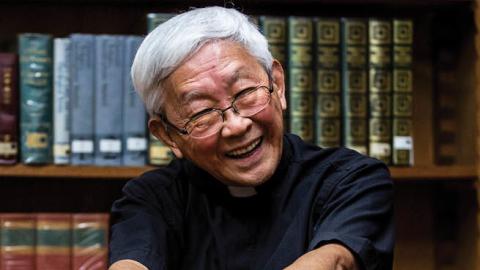Cardinal Joseph Zen, bishop emeritus of Hong Kong, was arrested yesterday evening under the vaguely worded National Security Law, formally charged, and released on bail several hours later. He likely faces a three-year prison term, according to a Hong Kong lawyer I spoke with, raising the prospect that the 90-year-old cleric would spend his last years behind bars.
The arrest of this world-renowned champion of religious freedom, human rights, and democracy goes beyond the personal. It signifies the end of religious freedom in Hong Kong, the last of the fundamental freedoms to be extinguished there. It is a moment of truth for both Pope Francis and President Biden.
Collusion with foreign powers, the specific charge against the cardinal, could apply to every Catholic bishop and priest, who pledge fidelity to the pope in Rome. These charges, though, were based on Zen’s role as a trustee of the now defunct 612 Humanitarian Relief Fund, set up for the legal and medical aid of pro-democracy protesters. Three other trustees were arrested at the same time.
Irrespective of the pretext, the Cardinal’s arrest was expected. In February, in a report in the pro-Beijing newspaper Ta Kung Pao in Hong Kong, Zen was likened to Falun Gong, which, for the past 20 years, the Chinese Communist Party has been savagely targeting for “elimination” in the mainland. He was blamed for “inciting” in 2019 pro-democracy protesters who had been educated in Christian schools. Such hatchet pieces typically presage roundups.
President Xi Jinping, who brooks no dissent, as we were reminded in the Shanghai Covid lockdown, is undoubtedly angered by many of Zen’s other stances as well. In the hierarchy of China’s Catholic Church, the cardinal has been the only remaining voice of dissent against the CCP. On the world stage, he has courageously condemned CCP encroachment on religious freedom and warned against the Vatican policy, under the Sino–Vatican agreement, to give the CCP power in appointing Catholic bishops in the mainland.
His arrest is designed to cow the Hong Kong church into submission to the CCP. Churches and Christian schools may still stand, but they will be teaching the commandments of the CCP and preaching Xi’s sayings, including “show no mercy,” his directive toward the Uyghurs, as was learned from government documents leaked to the New York Times. No independent voice, no conscience objection will be permitted, as church and state meld together under the CCP. Already, self-censorship has taken a firm hold in Hong Kong, even within Zen’s own Catholic Church, as seen in the restrained reaction to this latest injustice. In a statement, the Hong Kong diocese timidly only requests that authorities handle his case “in accordance with justice.” They make an oblique allusion for leniency given his advanced age. Chief executive–elect John Lee will start his term with one system, one government firmly in place, 25 years before the date stipulated in the agreement with Britain.
While the cardinal’s arrest has been in the works for a while, its timing is worth noting. It follows a Mother’s Day weekend when American Catholic churches were under attack by pro-abortion protesters, as President Biden stayed mute. The CCP is known to cynically employ American political memes to justify its persecution of Uyghur Muslims (China’s wolf-warrior ambassador to Washington tweeted that forced abortions were needed to “liberate” Uyghur women from being “baby making machines”) and Falun Gong (whom, in recent years, the CCP suddenly began calling “racist” and falsely accused of opposing interracial marriage). The CCP may have seen this as a favorable moment to make its long-intended move against Hong Kong’s popular Catholic leader.
Cardinal Zen left the police jail in silence, and his passport has been confiscated. For now, he has returned home, uncertain which month or year the trial is to begin. He certainly wouldn’t be the only Chinese Catholic bishop incarcerated. At least six bishops in the mainland are now in secret “black” jails, under house arrest or otherwise confined. But he is the first one in years to be ordered to face a trial. In the Mao era, numerous faithful Christian leaders suffered martyrdom and stunningly long punishments. Cardinal Ignatius Kung of Shanghai was imprisoned for 33 years, after being convicted at a show trial in the 1950s. A young Joseph Zen, born in Shanghai, no doubt drew inspiration from that Catholic hero. The CCP could be making Zen himself a martyr who will inspire a new Catholic underground in Hong Kong.
Pope Francis, silent so far on Zen’s arrest, faces a moral dilemma, not simply a diplomatic one. Will he demand that these political charges be dropped in the case? Will he proceed to renew the agreement to collaborate with the CCP in the appointment of Catholic bishops next October? The Vatican Secretariate of State should stop denying that the Chinese Church suffers “persecution,” and it should refrain from derisory assertions about a “psychological” problem in the case of those who, like Cardinal Zen, criticize Rome’s agreement with the CCP. The Secretariate of State should both acknowledge that the mission of the Catholic Church in China is not compatible with that of the CCP United Front Work Department and allow that agreement to expire.
President Biden, too, must break his silence. He must unequivocally condemn the unjust arrest of this Catholic cardinal and press China to respect the religious freedom of Catholics and all others and to uphold the last vestige of Hong Kong democracy.


















